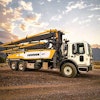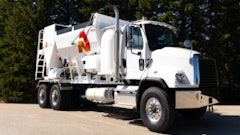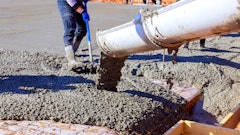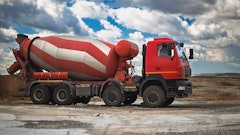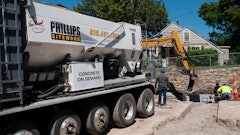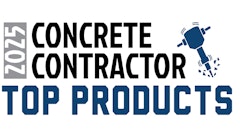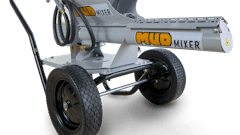Ordering concrete in smaller quantities can be an expensive inconvenience. Large ready-mix fleets don’t like short loads, so you must pay for a minimum quantity regardless of your needs. With concrete in short supply in many parts of the country, ready-mix fleets can give priority to large pours.
But there are solutions tailored to small pours. Despite being a well-kept secret, volumetric mobile mixers have a well-proven history. “I saw these mobile mixers when I was over in South Korea in the early 1960s,” recalls Don Mullin, owner, Concrete Express of Salem, CT. These trucks produce concrete on site. “We used these trucks to build runways. When a truck was empty, we would simply go back and refill it with sand, stone, cement and water and return to the site.”
Mobile mixers are basically self-contained batch plants on wheels. “It is a mobile mixing unit which carries — in separate bins — sand, stone, cement and water,” says Mullin. These ingredients are precisely metered into the mixing auger to produce the appropriate mix design.
In the early 1970s, volumetric mixers were viewed as the future, but problems with metering systems created maintenance and quality issues that relegated this technology to niche markets. Since then, there have been many improvements and innovations that have resulted in a reliable and consistent product, according to Mullin.
Volumetric mixer fills niche
In 1991, Mullin decided to go into business and the volumetric mobile mixers offered a niche business opportunity. “The ready-mix trucks are not equipped for and do not want to deliver small yardage,” says Mullin. “They cannot send a mixer with an 11-yd. capacity to deliver 1/2 or 1 yd. of concrete. Financially, it just doesn’t work. You are restricted to the fact that you have to take 5 to 8 yds. from a ready-mix company in order for them to turn a profit.”
Mullin started the business with two Elkin trucks. He also helped six other individuals start up in the business, each with two trucks. “The advantage is there for a small truck to mix at your site in the amount that you require,” he explains.
Bob Maine, owner of Short Load of Fort Pierce in Florida, has been in business since 1987 to serve the needs of customers with smaller jobs. “The barrel trucks are looking for the big, quick yardage where the batch mixers cater to smaller contractors,” he says. The company currently runs a fleet of nine Cemen Tech trucks.
The smaller size of these batch trucks tends to be an advantage. A single-axle truck is able to get into many places that are virtually impossible for a full-size ready-mix truck.
An efficient solution
Efficiency is a key attribute of the volumetric mixer. “You don’t need a place for waste materials that are left over in a barrel truck because you don’t have waste with a volumetric truck,” says Maine. “You leave the materials in the truck and use them at another time.”
Maine reports that 10 yds. worth of materials fit in his Cemen Tech trucks and he claims it produces the same quality concrete as a ready-mix truck. “It is just that it doesn’t pour out as quick as a barrel truck. You can spit a barrel truck out in almost 10 minutes where these mix on site trucks usually take a half hour.”
Mullin reports his Elkin mixer is capable of producing 30 or 40 cu. yds. an hour. This production rate is more than typical customers seeking small pours can handle.
“Generally, on small yardage pours there is a little bit more detail work involved,” says Mullin. “It is generally finish work that has to be minded and then made presentable as opposed to just pouring it in a large form for a floor or a wall.”
Since the concrete is mixed at the site, there is a little more time to get everything set up properly without having to worry about concrete hardening in the mixer. “We do want to get in and manufacture what you need at the site and get out, although we don’t rush people,” says Mullin. “If they need the time, they will be afforded the time.”
Concrete quality
Since the concrete is manufactured on site, freshness is not a concern. “You have more curing and drying time,” says Mullin. “Water or additives don’t have to be constantly added to extend the drying time.” This helps ensure the quality.
Making the concrete on site also allows you to customize the mix to match the conditions. “If one particular area needs it a little wetter or a little drier, all we do is regulate the water as we are mixing,” says Mullin.
While the slump can be adjusted, you are limited by the aggregates on the truck. “You can customize the mix design, but you cannot adjust it from a pump mix to a 3/4 mix on the jobsite,” says Maine. “That would entail emptying the rock side of the truck and putting a different size rock on.”
Training required
Training has to be addressed with volumetric mixers. “It is absolutely essential that you gain the experience of learning how to operate one of these machines before you attempt to do it yourself and expect to get good results,” says Mullin. He recommends continuous training.
Maine agrees, noting, “It takes a minor training period to introduce somebody to this since they are not well known. Not a whole lot of people have seen these types of trucks before. It takes us maybe a week introduction to get a guy used to what I am looking for.”
Support and upkeep
Support equipment needs are minimal. “With a volumetric truck, all you need is a cement silo, a front-end loader and an area to store materials,” says Maine.
“I use the bucket on the front of a backhoe,” says Mullin. “That way I get a little bit more bang for my buck. I use the backhoe occasionally for other jobs that I need to do.”
But these trucks do require regular maintenance. “All of your volumetric trucks are pretty much high maintenance,” says Maine. But he insists they are reliable if you keep up on the general maintenance.
Mullin adds that during his 14 years, Concrete Express has owned three different trucks. “As far as maintenance, normal preventive maintenance and normal wear and tear is all that I have experienced. To be honest with you, I have never had anything that I could not repair within an hour,” says Mullin.
------------------------------------------------------------
Accessible Concrete Delivery Finds Niche
Small, single-axle concrete drum trucks offer an attractive alternative for small concrete pours and short loads. Armed with this knowledge, and many years of experience in the concrete business, the Grant family formed Accessible Concrete Delivery in Phoenix, AZ.
Dennis Grant had been in the business for 35 years and has worked as a transport manager. His son, Eddie Grant, was a batch man with a major concrete producer. When they saw a 3-yd. concrete mixer offered by Mitsubishi Fuso, they recognized an opportunity.
They started the business a year and a half ago with one truck, bringing in Dennis’ daughter, Tracy Sullivan, to develop a client base. Through personal service and connections with the major concrete batch plants, Accessible Concrete has rapidly grown to three trucks with a fourth currently on order. Future plans call for even more trucks.
“I thought this was a good opportunity to treat the little guys like the big companies treat their big guys,” says Dennis Grant. “The key to the whole thing is personal service. It just kind of mushroomed from there. It is to the point now where we turn work away.”
They have built a positive reputation through on-time deliveries and quality assurance. “We don’t haul old concrete,” says Dennis. Some people will pour new concrete in with the leftover concrete. “There is nothing worse than pouring a floor in the summertime and having it blow up on you because you have 1/2 yd. of old concrete that was loaded on top of.”
With the high demand and tight supply in Phoenix, ready-mix plants generally require contractors to take a minimum of 6 yds. “Anything under that and they are going to charge you for delivery,” says Sullivan. With the larger contractors in town, that often leaves smaller contractors as a lower priority.
The 3-yd. Mitsubishi trucks allowed Accessible Concrete Delivery to focus on this market opportunity. The trucks weigh 25,995 lbs. when loaded. “It is just below 26,000 lbs., so there is no CDL required,” says Dennis. The trucks are capable of going places larger trucks cannot, such as over sidewalks.
Maneuverability with the cabovers is also an advantage. “Nothing handles like these trucks,” says Eddie. “I can get in a backyard probably better than with my pickup. I can turn on a dime and come right back out. I can be on one side of the street, do a U-turn, and get down the road. You have to be careful because they are top heavy, but there is an advantage to having a flat front.”
It did take some experience to get the compact mixers set up properly. The hoppers had to be modified. “We extended the hoppers to cover the boot area to control dust,” says Eddie. The batch plants also had to learn how to correctly load the trucks. “They want to load at the 10-yd. truck rate, but I went in and did some testing. We ended up finding out the proper load rates for the trucks.”
Because they have proven very reliable, Accessible Concrete would like a fleet of these mixers, but the Mitsubishi mixer trucks are no longer offered in the United States. So they have turned to Dickey Equipment in Dodge City, MN, for a 4-yd. mixer mounted on a Ford 8000 chassis.
For Accessible Concrete, image is important. “We get a lot of comments about our equipment,” says Sullivan.
Part of this is due to the business model. “Our people are owner/operators; I don’t want employees,” says Dennis. “I want people to feel they are part of the business. So we will get the truck and lease it to them. They have our name on the door and they are an owner. They haul our product. They pay a booking fee for each order.”
The result is a pride in the trucks. “They keep them clean,” says Sullivan. “They make good money and they take care of their equipment. You don’t see breakdowns.”
The business Accessible Concrete Delivery built on compact mixer trucks is thriving. “The only thing we don’t have is five or six trucks to service everybody on a consistent basis,” says Eddie.

